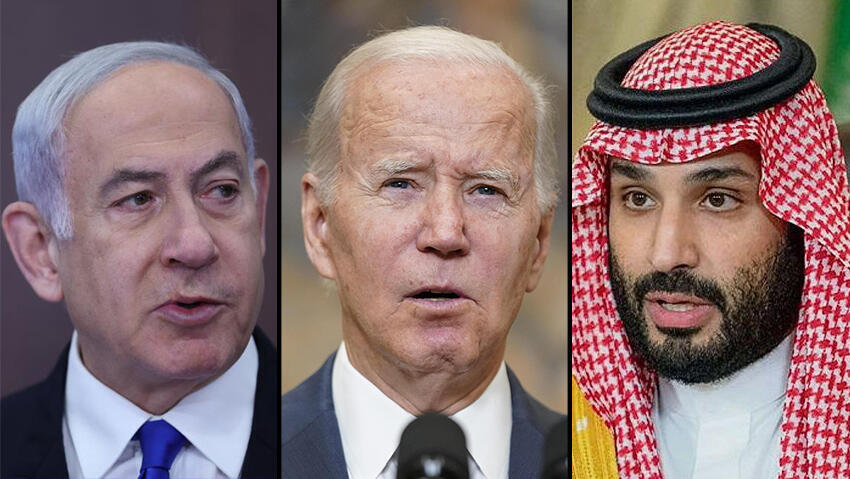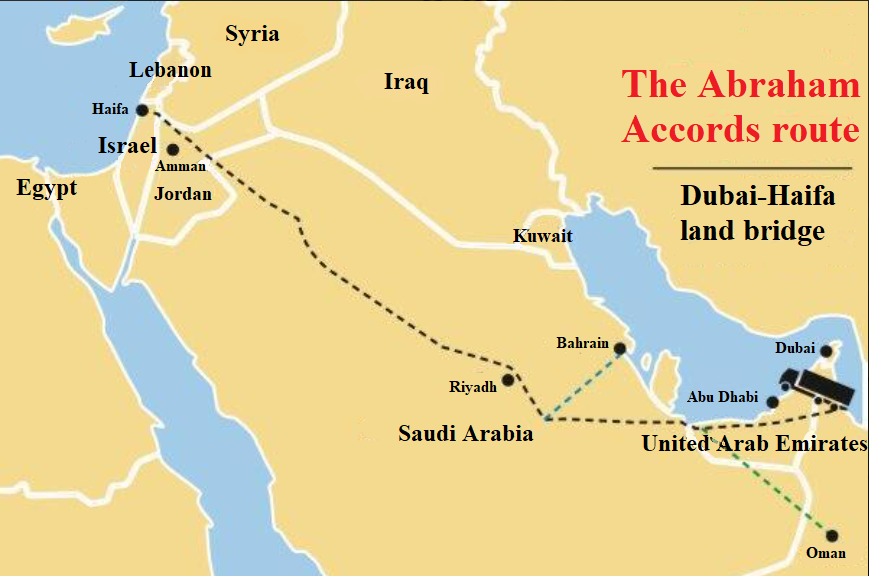Getting your Trinity Audio player ready...
Against all odds, and at a time when relations between Israel and the United States are not at their peak, Jerusalem and Washington are advancing a secret plan to establish a continuous land bridge connecting the United Arab Emirates, Saudi Arabia, Jordan and Israel, leading from the Persian Gulf straight to Israel's seaports. This is intended for the export of goods from the East to Europe through Israel, and later for tourist movement as well.
More stories:
The land bridge will enable trucks to transport goods while significantly reducing transportation costs and time compared to the current situation.
3 View gallery


Prime Minister Benjamin Netanyahu, U.S. President Joe Biden and Saudi Crown Prince Mohammed bin Salman
(Photo: Yonantan Sindel, AP, Reuters)
According to a study conducted by the Foreign Ministry and the U.S. government, the time reduction is estimated to be from two to three days to several weeks, and saving up to 20% in shipping costs.
Currently, trucks leaving the United Arab Emirates reach the port of Haifa via the Allenby Bridge but face bureaucratic procedures, including driver changes, paperwork and lengthy waiting times. Another expensive option for shipping goods is via ships through the Suez Canal and then to European ports, which is also costly.
The idea is to enable the arrival of a single truck and driver from Dubai to the port of Haifa, for example, without changing drivers and trucks at border crossings between countries. The Israeli Foreign Ministry presented the plan to the U.S. special envoy Amos Hochstein.
According to senior Israeli officials, the Americans were enthusiastic about the plan and began promoting it with the involved countries: the United Arab Emirates, Saudi Arabia and Jordan.
This is an infrastructure project crossing borders that will start in the United Arab Emirates, pass through Saudi Arabia and end at the seaports of Israel. It will later expand to Bahrain and Oman.
In Israel, there is a very good chance to advance the plan relatively quickly, even before Israel and Saudi Arabia establish formal ties, because all parties will benefit from shorter transit times and shipping costs, bridging the gap between the Far East and Europe.
Israel is simultaneously promoting the plan to Gulf countries, but it benefits from American backing. The land bridge will be based on existing roads but will require upgrading some of the routes and constructing certain sections.
The plan will require all countries to agree on standardizing the trucks so they can move between all countries and also agree on driver's licenses for the drivers authorized to travel smoothly and without delays along the route.
According to the developing plan, the land bridge will eventually serve tourism and travel purposes. The project will promote connectivity between Israel and regional countries in the fields of transportation, infrastructure and information.
According to sources familiar with the details of the plan, the project was made possible thanks to the signing of the Abraham Accords and the U.S. commitment to promoting peace in the region, one that could change the entire Middle East.
Meanwhile, Washington continues to promote a plan for railway connectivity from the Gulf to Israel and from there to Europe, but that is a project that will take several more years to implement, whereas the land bridge could be put into operation within a short time.
Foreign Minister Eli Cohen said, "The Foreign Ministry is working to expand the circle of peace and promote regional projects that will strengthen Israel's position in the Middle East and regional stability. Investment in infrastructure projects of this magnitude will contribute to promoting trade between countries, between Asia and Europe, and bring prosperity to the partner countries."
In a Foreign Ministry document obtained by Ynet and Yedioth Ahronoth, it was written, "The Abraham Accords have changed the political reality in our region and opened up new transportation routes. A regional land connectivity project between the Gulf states and Israel will be a game-changer that will upgrade global trade in the Middle East, improve Israel's position as a hub for transporting goods from the Far East to the Western world and highlight the role of the United States in the region.
The Land Connectivity by Trucks project will provide an easy solution to enhance trade on the ground, offer a platform for all partners - the United States, the United Arab Emirates, Saudi Arabia and Jordan, as well as other countries with interests in the region such as Bahrain and Oman."




